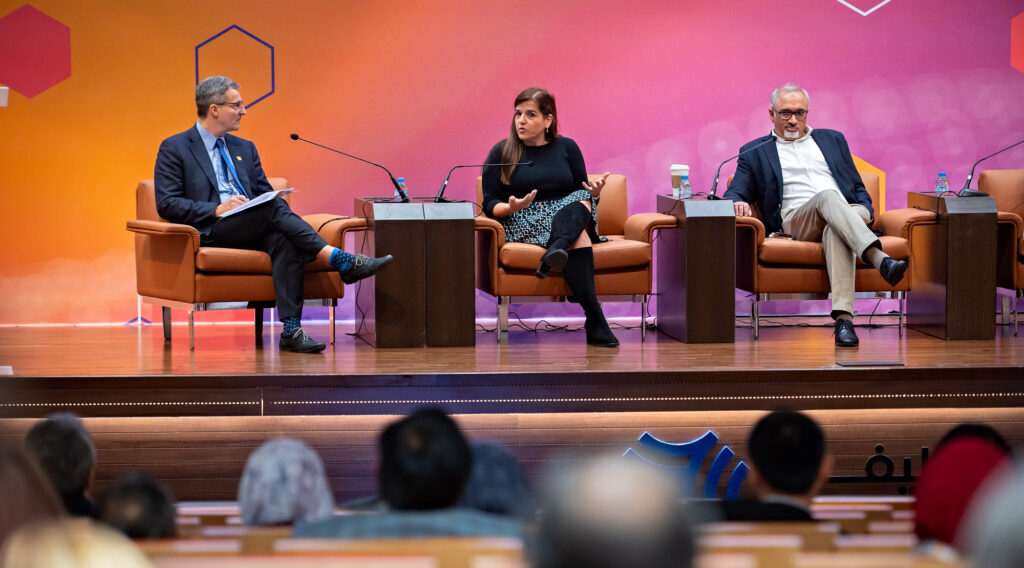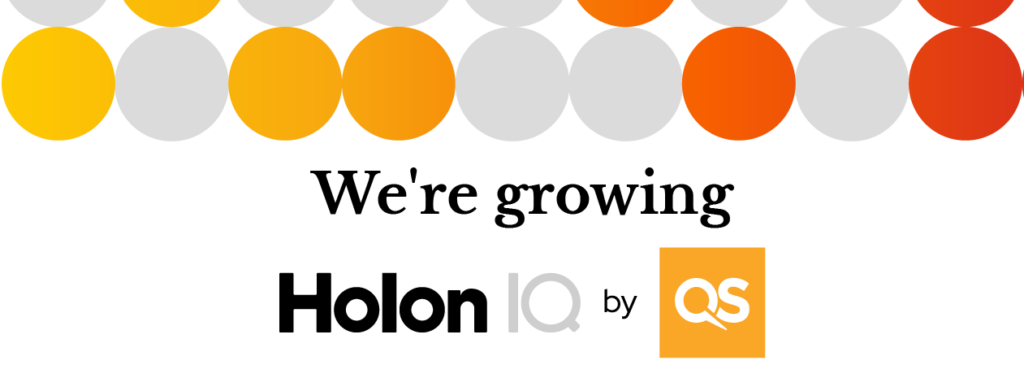
According to experts, the current era of advanced connectivity and automation will fundamentally transform business education – employers are increasingly looking for graduates who are able to leverage AI and other technologies to create innovative solutions to business problems.
Growing demands for graduates to have critical and ethical thinking skills present a challenge for business schools.
“It is a very different world than the world we have today with a regular MBA. You have got to be ready for it.”

Thought leaders of business education led a panel at the QS Reimagine Education Awards & Conference 2023, hosted by Khalifa University, to discuss the challenges and opportunities business schools currently face and how they can remain relevant and effective in an era of rapid change.
The driving forces for change
Speaking on the panel CEO, President and Dean at Asia School of Business Professor Sanjay Sarma noted “admissions are down, costs are up, people want to work while getting educated and the gig economy is booming” are just some of the key reasons for change. “For example, you work for an insurance company and its 2030. You’re a recent graduate and your boss says, ‘there’s been a flooding, there has been a property loss and I want you to figure out where the flooding is going to go, a communication plan, a financial plan to compensate.’ You will be using AI, weather predictions, you’ll being doing marketing and communications. It is a very different world than the world we have today with a regular MBA. You have got to be ready for it. If we don’t change, we become outdated and obsolete.”
However, Jerry Wind, Emeritus Professor at the Wharton School, thinks business schools are already under threat: “I think the dimension we don’t talk about is the fact that our current offerings are pretty obsolete. If we were to design a business school or any school for the benefit of achieving our vision and mission in the learning of the students in a world where you are primarily focusing away from the shareholder orientation to the stakeholder orientation, we would never design a school that is semester-based.
“With universities striving to go back to the pre-pandemic era while ignoring the success of it and how we were able to deal with the changes, we’re ignoring the need for personalised education. Fundamentally, every aspect of the business school is not really related to the way that knowledge is given or will be the most effective. A business school was designed for the convenience of administrators, not for the benefit of the learners. What we have to do is rethink our offering and start from scratch.”
Moving fast while identifying, evaluating and improving
AI is becoming an integral part of our modern world. According to the panellists, when it is first used for educational purposes, the primary step should be to mandate its effective use and measure what really matters.
Professor Wind said “the way to address issues is to start any assessment by requiring the students to identify the generative AI platform they want to use, the way they’re probing it and to start with the results they got. Then you must focus their attention on how they evaluate it, which allows you to evaluate their cognitive skills and how to improve on it – which allows you to then evaluate their creative skills.”
Additionally, while a strategy is required to implement the technology appropriately and efficiently, it must also be acknowledged that adapting to technological advancements is equally important. Professor Sarma added that while “the ability of large language models to absorb unstructured information and then to generate high quality responses is game changing”, the limitations generative AI has will mean “we as human beings would have to carve out a space for ourselves where we have jobs and tasks.
“For example, an AI system cannot negotiate a new bond agreement — that’s where we need to come in. If you work backwards from that, then AI is going to change practices and we need to change our practices to reflect that. It’s going to change pedagogy. It’s sort of an existential re-thinking of education.”
Along with business education, Professor Sarma explained that this needs to be reflected in all fields of academic study: “An AI course I prepared six weeks ago is already out of date because of something Open.AI just announced. I truly believe that we’re at a pivotal moment – education has to wake up to this.”

Together, we are better
Despite the challenges in business education, history has demonstrated that with university collaboration, we can improve opportunities for students by learning from each other’s past highs and lows.
Vice-Dean (Education) of Imperial College Business School, Leila Guerra added: “We have a purpose that goes beyond institutional needs, and we should collaborate together. We have to learn from each other and make mistakes with each other which was not the case maybe 20 years ago and I think that comes from the knowledge that the biggest challenges we are facing, we can only sort together.”
In order for business schools to educate and prepare the leaders of tomorrow, will they need to realign their framework with the industry’s demands and skills?
In his contribution to the panel, David Bach, Dean of Innovation and Programmes at IMD Business School, noted that business schools need to work with large multinationals to ensure their graduates are work-ready.
“If you want to remain relevant, we need to pay attention to how those needs are evolving and graduate students who have that entire toolkit at their disposal – we can’t put that on the companies expecting them to continue to recruit our talent. In order to make those changes, we need to be in those conversations.”



